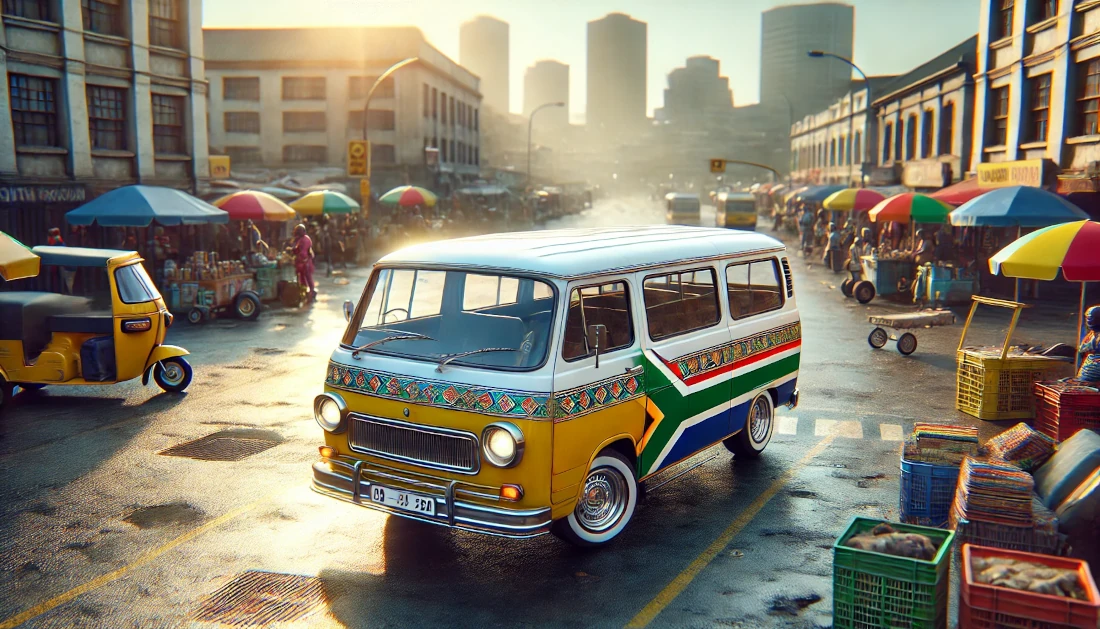The Gcaba brothers have carved out a position of immense wealth and influence in South Africa, with their empire firmly rooted in the taxi transportation industry. This exploration delves into their origins, diverse business ventures, controversies, and the legacy of their rise—marked by both remarkable success and persistent scrutiny.
With an estimated net worth reaching up to 10 billion rand, the Gcaba brothers are among South Africa’s wealthiest figures. Their fortune is anchored by their expansive taxi operations, which include a fleet of over 500 vehicles dominating routes across KwaZulu-Natal. This dominance has not only solidified their reputation as transportation moguls but also attracted controversies that continue to shape their public image.
The South African taxi industry isn’t just a business, it’s a battlefield. It’s cutthroat, chaotic, and sometimes downright criminal. The Gcaba brothers’ story is a case study in how this industry operates more like a mafia than a legitimate enterprise. Routes are power. Controlling them means money, influence, and, enevitable, blood. Simon Gcaba’s assassination and the violence that followed show how high the stakes are. It’s not a business for the faint-hearted or the purely lawful but it’s one of South Africa’s biggest and the Gcaba’s are at the top of the game.
Key Figures and Structure
The Gcaba family is large and influential, with members like Mandla, Sthembiso, Mfundo, Nkosikhona, and others playing significant roles in the business. Mandla Gcaba, a prominent leader within the family, once served as CEO, overseeing the organization’s growth. Together, they’ve maintained the company’s status as a leading black-owned business empire in KwaZulu-Natal, rooted in their heritage and entrepreneurial drive.
The Gcaba family’s rise began in the 1970s with Simon Mkhulekelwa Gcaba, a pioneer in South Africa’s taxi industry during apartheid. Leveraging his leadership and public relations skills, Simon built a thriving transportation business, despite the systemic challenges of the era. However, his success was marred by tensions with a former associate, Big Ben, and in 1996, Simon was assassinated under mysterious circumstances. This tragedy left his sons to inherit the family business amid growing instability and violence.
Despite intense challenges, including expulsion from key taxi ranks and violent attacks on family members, the Gcaba brothers rebuilt and expanded their operations. They diversified into buses, security services, and even technology, cementing their reputation as resourceful entrepreneurs. Their resilience turned the family business into a powerhouse, making them a dominant force in South Africa’s transportation sector.
The Gcabas’ influence extends beyond business, thanks in part to their familial ties to former South African President Jacob Zuma. This connection amplified their power but also fueled public scrutiny. Though admired for their success, the family remains controversial due to the violent environment surrounding their operations and their perceived political entanglements, making them both celebrated and polarizing figures in South Africa’s socio-economic landscape.
A Transportation Powerhouse
The scale of the Gcaba brothers’ transportation business is vast, encompassing one of the largest taxi and minibus fleets in KwaZulu-Natal, South Africa. The Gcaba brothers manage over 500 vehicles, a substantial number even by South African standards, where the taxi industry is dominated by smaller, individual operators. This positions them as major players capable of servicing thousands of commuters daily. Their taxis operate across urban hubs like Durban and rural or suburban areas in KwaZulu-Natal. This diverse coverage means they meet the needs of commuters traveling for work, education, and leisure in both high-density and underserved areas. The brothers reportedly have control over some of the most lucrative taxi routes in KwaZulu-Natal, securing steady and substantial income streams. Routes with high commuter demand, such as those between Durban and surrounding towns, are a critical part of their business model.
In South Africa, where public transport infrastructure is limited, the minibus taxi industry serves as the backbone of daily transportation. The Gcaba brothers’ operations are integral to KwaZulu-Natal, facilitating movement for workers, students, and small businesses. Their reach affects the economic pulse of the region. Operating a fleet of this size requires a significant workforce, including drivers, mechanics, administrative staff, and security personnel.
Beyond taxis, the Gcaba brothers have diversified into bus transportation. Buses allow them to serve larger groups, potentially targeting long-distance and corporate routes, which can generate higher revenues compared to minibus taxis. Reports of their interest in technology patents indicate a forward-thinking approach to modernizing operations, possibly improving route planning, fleet tracking, or payment systems. With over 500 vehicles operating daily, each likely generating between ZAR 1,000 and ZAR 2,000 per day (average daily earnings in the taxi industry), the Gcaba brothers’ fleet could earn ZAR 500,000 to ZAR 1,000,000 daily, translating to hundreds of millions of rands annually.
The Gcaba brothers have not limited themselves to transportation. They’ve diversified their investments into real estate, hospitality, and other lucrative sectors, steadily building a robust portfolio. These ventures have bolstered their financial position and expanded their influence into areas beyond their taxi empire.
Controversies and Allegations
The South African taxi industry is a notoriously tough and dangerous business, often described as operating like a mafia due to its entrenched violence, power struggles, and intricate ties to criminal networks and political elites. The Gcaba brothers’ experience highlights how this environment stages the Gcaba brothers’ story is far from unblemished. They have faced numerous allegations of criminal involvement, ranging from extortion and murder to questionable business practices. While they have consistently denied these accusations, the shadow of these claims has added a layer of complexity to their public image.
According to a News24 Report, The family’s involvement in the taxi industry has been marred by violence and legal issues. In 1996, their father, Simon Mkhulekelwa Gcaba, was assassinated, leading to a series of violent incidents, including the murder of his son Moses and an attempted courtroom hit in 1998. Mandla Gcaba was charged with arranging the hit but was acquitted after a key witness disappeared. TimesLive wrote that in 2015, Mfundo Gcaba was accused of leading a hostile takeover of taxi routes, resulting in violent clashes.
More recently in Swisher Post it outllined that in 2024, Mfundo was implicated in the murder case of rapper Kiernan “AKA” Forbes, with allegations of a substantial payment linked to the crime. The family has denied these allegations, emphasizing their commitment to lawful business practices.
The taxi industry is largely unregulated and highly competitive, creating fertile ground for turf wars and illegal practices. Operators compete for control over lucrative routes, which can bring in substantial daily income. This competition frequently leads to violence, with assassinations, intimidation, and extortion being common tools of enforcement and dominance. The assassination of Simon Gcaba and the violent deaths of other family members illustrate how dangerous it is to control these routes.
In many cases, violence is not just a byproduct of competition but a deliberate strategy. The 2015 accusations against Mfundo Gcaba for leading a “hostile takeover” of taxi routes reflect the use of force to expand influence and intimidate rivals. This isn’t just about cabs fighting for fares. It’s about networks criminal ones, political ones to be specific. When you hear about courtroom hits, disappearing witnesses, and accusations of orchestrated murders, you realize this industry has deep roots in South Africa’s underworld. And let’s not ignore the prison pipeline. The line between operating a taxi fleet and running a criminal syndicate? Pretty blurry.
Political Ties and Influence
The Gcaba brothers’ reach extends beyond business, touching the realm of politics. They are reportedly linked to former South African President Jacob Zuma through familial ties and are said to have supported him politically, allegedly providing logistical aid during key events. However, the brothers deny any direct involvement in political affairs, aiming to distance themselves from claims of unrest or manipulation tied to their transportation services. The Gcaba brothers are nephews of former South African President Jacob Zuma, a relationship that has drawn public scrutiny. They have been accused of using their political connections to secure business advantages, such as a controversial R300 million deal to run Durban’s metro bus fleet without a tender in 2009. According to the News24 article.
Public Perception and Legacy
Public opinion on the Gcaba brothers is divided. On one hand, they are celebrated for their entrepreneurial spirit and ability to build a thriving business empire in a challenging environment. On the other, allegations of criminal activity and political entanglements cast a shadow over their legacy. Regardless, their impact on South Africa’s socio-economic landscape is undeniable.
The Bigger Picture
The Gcaba brothers’ financial success, marked by visible assets and extensive business ventures, has cemented their place as one of South Africa’s wealthiest and most influential families. Their story is a blend of ambition, resilience, and controversy a reflection of the complexities that often come with such immense wealth and power. As their operations grow, so does the public’s fascination with their journey and the ongoing impact of their actions.
Why the Taxi Industry Is So Powerful?
The taxi industry in South Africa holds immense political power because it’s the backbone of public transport, moving over 70% of the working class daily. Trains and buses can’t compete with its reach, especially in rural and underserved areas. This makes the industry indispensable, giving it massive leverage. Any disruption (like a strike or route closure) can bring cities to a standstill, forcing politicians to engage directly with taxi associations and operators to avoid chaos.
The money flowing through the taxi industry is staggering, generating billions of rands annually in cash. This wealth doesn’t just sustain operations; it funds lobbying, political campaigns, and, at times, less savory practices like bribery. Taxi associations, acting as powerful unions, are key to this influence. They’re highly organized and capable of enforcing their agendas, whether through negotiation or more aggressive tactics. Aligning with these groups provides politicians with access to funding and large voter bases, making them almost untouchable.
Taxi operators are deeply rooted in their communities, giving them grassroots influence that politicians can’t ignore. They’re seen as entrepreneurs and community leaders, which allows them to sway public opinion. This is further reinforced by the industry’s legacy of resilience, having thrived during apartheid as one of the few avenues for Black economic empowerment. Post-apartheid, the industry retains this stature, with many operators viewed as symbols of economic success and independence.
The industry’s political power is also underpinned by its willingness to play hardball. Route wars, violent strikes, and resistance to competing infrastructure projects are all tools it uses to maintain dominance. Politicians seeking to implement bus systems or rail projects often face backlash from taxi operators who see these as threats to their revenue. With direct ties to powerful politicians and a reputation for ruthlessness, the taxi industry has secured its place as an untouchable force in South Africa’s political and economic landscape.





